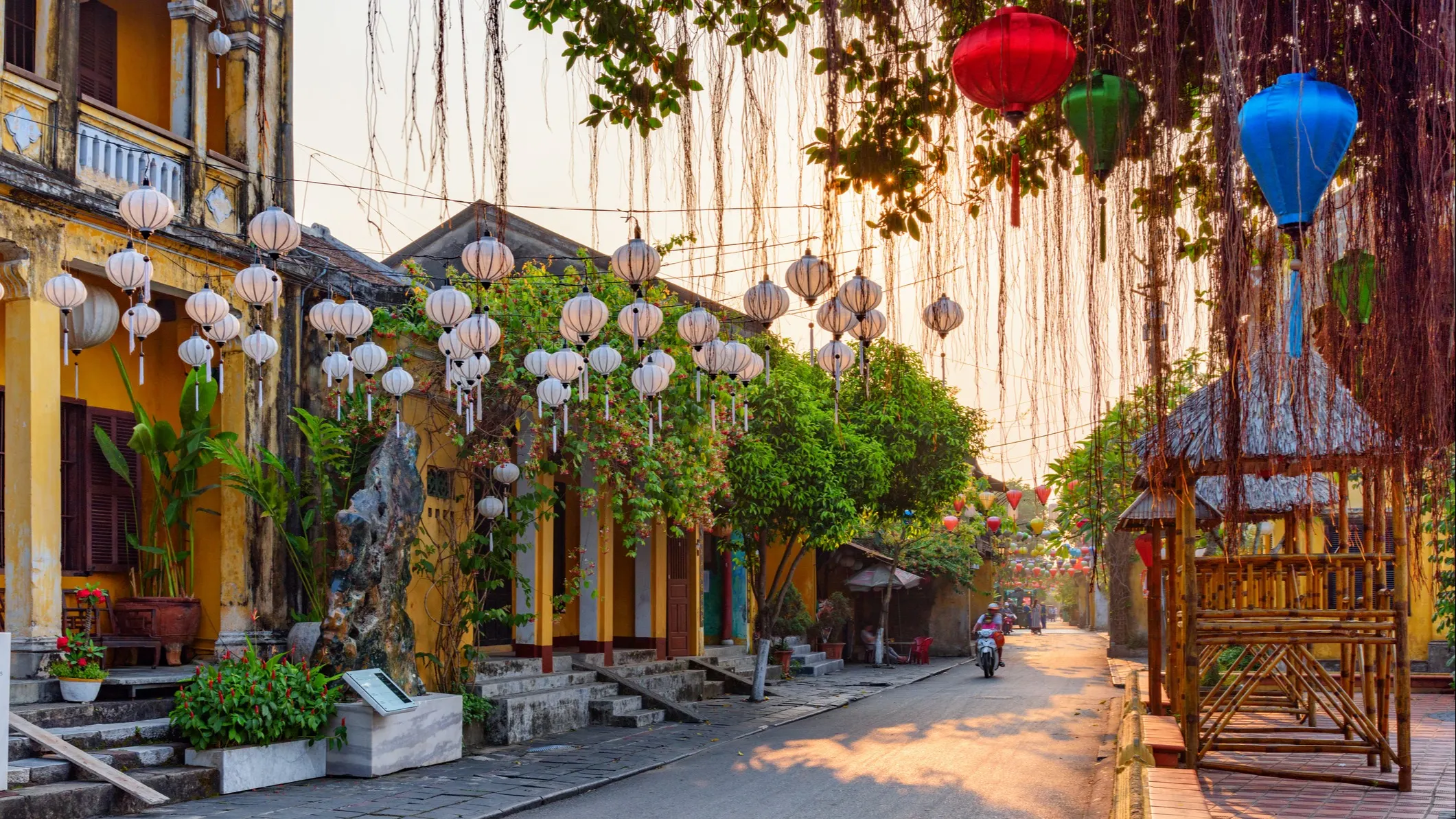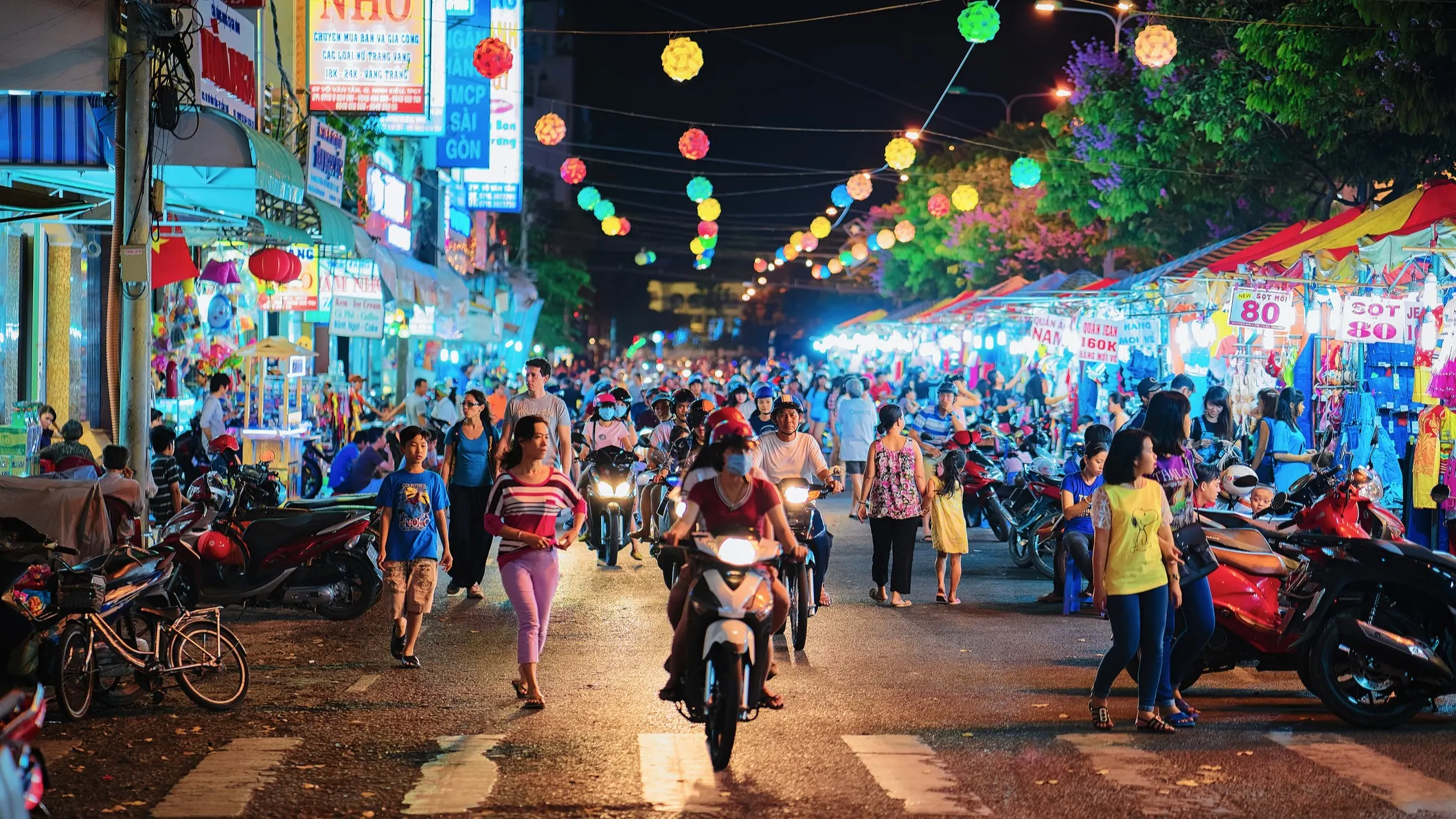Living in modern-day Vietnam is safe and fun. I’ve had to shake my head when people asked me over the years whether there is still a war being fought here; that war officially ended over 40 years ago and Vietnam has moved forward. According to the 2019 Global Peace Index, Vietnam ranks 57th out of 163 countries in safety—well above the United States in the 114th position.
In today’s Vietnam, violent crime is rare. The greatest risks are being overcharged by a taxi driver or street vendor, being involved in motor vehicle accidents, or crossing a busy road.
At first glance, you might think that crossing the street in Vietnam is a life-endangering act. Cars and motorbikes don’t yield to pedestrians, but they do adjust to your presence and make every attempt to avoid hitting you. Here’s the secret: once you begin crossing the street, don’t stop and think about it; keep a steady, slow, and predictable pace and watch the traffic flow around you like water in a rocky stream. If you can’t bring yourself to take that first step on your own, there’s safety and comfort in numbers: wait until there are others ready to cross and join the group. I have lived in Vietnam for nearly 10 years and have never had a narrow escape. Vietnamese, being the ever-helpful and kind people that they are, will commonly assist foreigners with getting across the street safely; more than once, an elderly woman has taken me by the arm and gently guided me through a busy intersection.
Driving in Vietnam has its risks, especially on the busy highways. I generally avoid driving on high-speed highways; motorbikes are often restricted from highway access or delegated to driving on the shoulder. Traffic is chaotic in the cities, but if you take the time to learn the rules of the road—and they do exist—you’re unlikely to be involved in more than the rare low-speed fender-bender. Many people choose to drive small, environmentally friendly electric motorbikes in the city; they’re fast enough to go the speed of traffic and light enough to be easily maneuverable.
Burglaries and other crimes of opportunity are uncommon but are more likely to occur in Vietnam’s urban areas. Lock your doors and don’t leave valuables lying out in the open unattended. Being aware of your belongings and your surroundings is all that is needed to avoid being a victim—not just in Vietnam but anywhere.
Vietnam is not prone to earthquakes, volcanoes, or wildfires, though heavy monsoonal rains and occasional typhoons can affect low-lying areas. Cities where expats are likely to live have adequate infrastructure to prevent disastrous flooding, but temporary road closures, fallen trees, and downed electric lines aren’t uncommon when heavy storms occur. Parts of Hoi An and Ho Chi Minh City can experience flooding that may take several days to resolve. In these areas, it’s best to consider less flood-prone locations when choosing a place to live.
Vietnam has an outdated reputation for scams; they happen far less frequently now than a decade ago. Unscrupulous taxi drivers are the most common culprits, but ride apps like Grab Taxi (similar to Uber and Lyft) have all but eliminated that risk. Reputable taxi companies include Vinasun, Mai Linh, and Hanoi Taxi Group. Unless you know where you’re going and how to get there, it’s best to avoid the smaller, less established taxis; regardless of which taxi you use (except for Grab), the driver should be willing to use a meter. Grab taxis operate on fixed rates so you will know exactly how much to pay when you make your booking request. If you want to take a ride in a cyclo (a three-wheeled bicycle taxi) or on a motorbike taxi, be sure to agree on the price before starting your trip. Always agree on a price before purchasing anything from a street vendor; having your picture taken with a vendor’s basket of pineapples balanced on your shoulder or getting a shoeshine should never cost more than a dollar or two.
Vietnam is famous for its fresh and delicious food, and it’s extremely unusual to get any consumable that is of a substandard quality. If you have any concerns, a good rule of thumb is to eat where the locals eat. They’ll frequent the places with the best food and you’ll know that what you are getting is fresh and good. Fresh fruits are also safe to eat; there is no need to have concerns about the safety of your food in Vietnam.
If a restaurant or coffee shop serves you a glass of water or tea, they will use either bottled water or water that has been passed through a filtration system; either way, it’s safe to drink. Most hotels provide hot water kettles in the room; fill the decanter with tap water, let it come to a complete boil, and use it for making hot coffee or tea. Bottled water is provided at almost all hotels in Vietnam and is available at every supermarket and minimart.
Top Tips for Staying Safe in Vietnam

No place in the world is entirely safe, but you’re unlikely to run into problems in Vietnam. Violent crime is extremely rare and aside from the risk of motor vehicle accidents, it is unusual to experience any safety problems. Tourism is growing at a phenomenal rate; 18 million people visited Vietnam in 2019, an increase of more than 16% on the previous year and an all-time record for the country. You will encounter young backpackers, tour groups, older couples, families, and solo travelers; everyone is made to feel welcome in Vietnam.
Even though Vietnam is considered a safe country to visit, it’s best to keep the following things in mind:
Carry copies of your travel documents. Many hotels will ask that you leave your passports at the front desk for the duration of your stay. It’s the law, this is normal, and the hotel will keep them safe. If you plan to rent a motorbike or go on a tour, you may need to show your passport and visa information; copies of these documents will suffice. Having copies will also help enormously if you lose your original documents.
If you’re on a motorbike, wear a helmet. Not only is it the law, but motor vehicle accidents pose the biggest safety risk in Vietnam. Traffic is frequently congested, which comes as no surprise considering that there are more than 58 million motorbikes and several million automobiles registered here—a number that is growing in double digits annually.
Be aware of overly helpful strangers. The vast majority of Vietnamese people are genuinely helpful, but there are a few characters who may hope to earn a commission by guiding you to specific vendors. For example, if someone insists on accompanying you into a store to help you make a purchase, politely but firmly decline. Better yet, go to a different store—alone.
If you’re taking a taxi, know your route beforehand and be vigilant that the driver isn’t taking you on “the scenic route” as the meter ticks away. The meter should tick slowly, too—if you see one that looks as if it’s running at high speed, stop the ride immediately. This isn’t as common as it used to be, but still happens occasionally, especially at train stations and areas where tourists are likely to gather. Your best bet is to use Grab, Be, or one of the other local ride-sharing services where the price is set before you ride.
Stay away from marijuana and other recreational drugs in Vietnam. They are not legal and getting caught can result in serious consequences.
Don’t take photos of government buildings or military posts.
Avoid participating in protests or being in the middle of one. Protests are unusual in Vietnam but occasionally do occur.
Take plenty of water when it’s hot outside to avoid dehydration.
Keep your valuables tucked out of sight. Snatch thefts are most likely to occur in Ho Chi Minh City, and thieves are remarkably skilled at removing purses and cell phones from distracted passerby.
Get a local SIM card. A card costs only a few dollars and a prepaid plan with a month of unlimited data costs less than $4. You’ll have instant access to maps and bus routes, as well as the ability to call your hotel, the police, or your embassy if assistance is needed.
Keeping Your Money Safe in Vietnam

One of the challenges of understanding Vietnam is becoming familiar with its currency. One U.S. dollar is equal to more than 23,000 Vietnamese dong, and a million dong is less than $45; all the zeros can be confusing. Knowing approximately how much things should cost will prevent any intentional overcharges.
On the other hand, don’t over-bargain when shopping. A shop owner or vendor may be happy to take a bit off their asking price if you’re bargaining with a smile, but don’t haggle over a thousand dong—after all, that’s not even five cents.
Wear a money belt to carry the bulk of your cash. If you use a pouch, keep it close to you and wear it on the inside of your clothes.
Don’t count your money in public.
Always pack a back-up credit or debit card for emergencies.
Be aware of your surroundings when withdrawing cash from an ATM. If in doubt, find an ATM inside of a bank or one that has a guard posted. Cover your hand when entering your personal identification number so that no one can see it.
Use the safe at your hotel for your valuables and only carry what you need, especially in Ho Chi Minh City.
Is Vietnam Safe to Travel Alone?

Vietnamese people are so friendly that it’s unlikely that you’ll be alone for long. You’ll find that there is frequently someone who speaks English who is willing to help with directions or assistance. They’ll be curious about why you are alone and will probably ask you a lot of questions about that, but it’s just curiosity; after all, there are still parts of Vietnam where the local people may have never come into contact with a foreigner. Here’s a few tips on having a fun and safe trip traveling solo:
Let someone back home know where you are and update them frequently in the unlikely event that something happens.
Consider joining short group tours, especially if you’re not used to traveling abroad alone. It’s easy and inexpensive to take a street food tour in Hanoi or a tour of the Cu Chi Tunnels near Ho Chi Minh City.
Be aware of your surroundings. If something doesn’t feel right, listen to your instincts.
Dress like a local. Avoid wearing short shorts, skimpy tops, or showing a lot of skin, not only in temples but on the street, as well.
If you’re not sure about the neighborhood, especially in urban areas, avoid going out by yourself late at night. It’s more of a precaution, as it is extremely unlikely that you would be in an unsafe situation, but if you have doubts, err on the side of caution.
If you have been drinking and it’s late at night, have a taxi take you back to your hotel.
Petty Crime
Overall, Vietnam is a safe country, though pickpocketing and snatch thefts occur occasionally, especially in urban areas where foreigners are most likely to be present. The only city in Vietnam that has a reputation for petty crime is Ho Chi Minh City (Saigon), though rare cases have been reported in Nha Trang, Da Nang, and Hanoi.
Common sense is the best prevention. Be aware of your surroundings, don’t count your money in public or wear a money pouch over your clothes, and don’t leave valuables unattended. If you have a handbag with a shoulder strap, place the strap over your head to prevent a snatch theft. Avoid talking on your phone while standing near the street; duck into a doorway instead.
Scams used to be a common component of the tourist experience in Vietnam, but over the years, they’ve decreased almost to the point of obscurity. On rare occasions, someone might offer to give you a shoeshine, a ride, or take your picture, only to attempt to charge $25 or even more for the service. Always agree on the price before making any commitments.
If you forget a valuable item somewhere, it’s more likely that someone will chase you down to return it to you. Most Vietnamese are exceedingly honest.
Violent Crime
Violent crime is rare anywhere in the country. As with petty crime, the best prevention is to be aware of your surroundings and use common sense. Sexual assaults are uncommon but do occur in some urban areas, particularly at night. Avoid leaving popular bars late at night to walk home if you’ve had too much to drink; take a taxi instead. Guns are illegal and homicides are practically nonexistent in Vietnam. The few that do occur have rarely involved foreigners. The emergency number for the police is 113. You should also report any serious crimes to your embassy.
Areas to Avoid
Vietnam has few, if any, slums. Most neighborhoods are economically mixed, with grand homes and humble shacks, built shoulder-to-shoulder on the same street. The result is that there are few bad neighborhoods anywhere in the country, including Vietnam’s largest cities.
Use caution when in a densely packed crowd or on a busy dance floor where pickpocketing is most likely to occur; keep your money tucked into your front pockets or in the safe of your hotel room.Well-lit streets are safer than dark ones, though again, the chances of any crime occurring even on dark streets is highly unusual. The majority of Vietnamese go to bed early and wake up at dawn; by 11 p.m., the streets are empty and nearly everyone is asleep.
Nightlife Safety
The Vietnamese love drinking beer and singing karaoke, and local drinking and karaoke establishments do a brisk business, even in the countryside. Local folks are almost always happy to sit with foreigners over a beer, looking at photos, or chatting (using a translation app on your phone comes in handy).
Wherever you end up in the evening, be sure to keep watch over your belongings. A purse slung over an empty chair, an unattended camera, or a fancy phone can be a temptation.
Spiking drinks isn’t common, but it’s not unheard of, either. Watch your drinks at clubs and be aware of your surroundings.
Drink in moderation and use caution when you leave a bar, especially late at night. When in doubt, take a taxi even for short distances.
Transport Crime
Disreputable taxi drivers are notorious for overcharging fares, especially from transportation hubs and tourist attractions. Almost all taxis have meters, and most drivers use them, though they might take a circuitous route if they suspect that you aren’t familiar with the area. Some scoundrels have doctored meters, which click at an alarmingly fast pace; if you suspect that you’ve accepted a ride from one of these taxis, tell them to immediately let you out, pay the fare, then hail a different taxi. These drivers usually lurk around train or bus stations. When in doubt, walk a block or two away from the station and then hail a taxi; drivers are far more likely to be honest.
Ideally, it is best to use one of the taxi companies with a long-standing reputation for hiring honest drivers. Mai Linh Taxi is available throughout most of Vietnam, Hanoi Taxi Group in Hanoi, and Vinasun, which serves almost all of central and southern Vietnam, are all good choices.
Alternately, Grab Taxi, a ride-hailing app similar to Lyft and Uber, serves most cities in Vietnam. Fares are fixed and the drivers tend to be pleasant and reliable. Most smaller towns have a mix of taxi companies and the drivers are usually honest and knowledgeable.
Motorbike taxis, called xe ôm, are also widely available. Anyone can drive a motorbike taxi, so if you decide to travel this way, be sure to agree on the fare before you accept the ride. Grab Taxi also offers this service, with fixed fares and door-to-door service.
Women’s Safety
On rare occasions, single women travelers may experience harassment. Avoid walking on dark streets in unfamiliar neighborhoods alone at night or dressing immodestly at any time of the day. Traveling in a group, such as taking a tour, is often the best way to visit out-of-the-way tourist sites, meet other travelers, and avoid any unwanted attention.
LGBTQ+ Safety
Although Vietnam is a socially conservative country in some ways, the Vietnamese are refreshingly tolerant of the LGBTQ+ community. Avoid public displays of affection—the same applies to heterosexual behavior—and you’ll be fine. Vietnam has no laws against same-sex relationships.
General Tips
Typhoons and tropical storms occur frequently in coastal areas during the late summer and autumn months. Be aware of the weather conditions during this time, as flooding and high seas are possible, especially in central Vietnam. Torrential rains can cause flooding, landslides, and road closures, primarily in mountainous areas.
Vietnam requires no mandatory vaccinations, though travelers should have their tetanus and hepatitis vaccines up to date. Dengue fever, caused by mosquitos, occurs sometimes in urban areas; there’s no vaccine for this, so bring a good DEET-based repellent and use it when mosquitos are out. Malaria isn’t prevalent anywhere in Vietnam.
Related Articles
Things to Do in Hanoi, Vietnam
